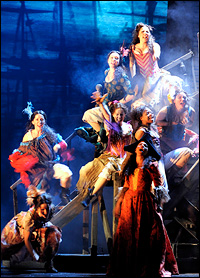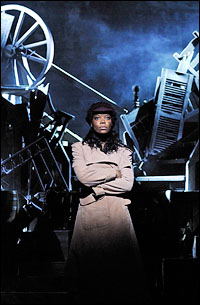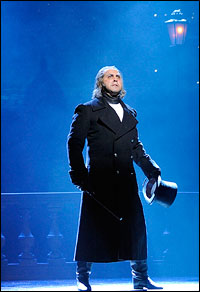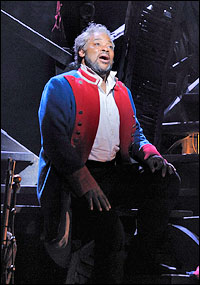
*
Cameron Mackintosh, the British producer who discovered the Paris musical Les Misérables, by Alain Boublil and Claude-Michel Schönberg, and developed it into a smash English-language sensation in London, on Broadway and around the world (ultimately, in many languages), wanted to reinvent the show for its 25th anniversary. He put Laurence Connor and James Powell — two new directors with a passion for, and history with, the show — on it, and they worked with new collaborators to freshen the orchestrations, create new scenic design (inspired by paintings by source author Victor Hugo) and bring a grittier and more naturalistic acting style to the pop opera, known for its oversize emotions. They also did away with the signature staging element of the original production (directed by Trevor Nunn and John Caird) — a turntable that allowed for cinematic shifting of scenes and characters. The 25th anniversary staging was a hit on tour in the U.K. and played a limited fall 2010 engagement at London's Barbican, the show's English birthplace. (The original Nunn-Caird production remains on the West End, by the way.) This new Les Miz was launched by an American cast on a North American tour in early January in Philadelphia, following a fall 2010 test run at Paper Mill Playhouse in New Jersey. We spoke to Mackintosh — whose work also includes Oliver!, The Phantom of the Opera and Mary Poppins, among many other productions — by phone about Les Miz, his primary theatrical passion.
Some colleagues of mine saw the Paper Mill Playhouse production and particularly loved the new visual world of the show. They said it felt incredibly fresh.
Cameron Mackintosh: Well, that was the intention. Miraculously, the London production is still doing amazing [business]. In fact, it's now got the biggest advance it's ever had in its history, in its 26th year, which is amazing. But I felt, for 25 years, I simply did not want to keep on producing the same show, the same production. In any normal [show's] life, lots of other people would have done different productions [by now] and the original would long be finished. But this — and Phantom — are such miraculous shows that they seem to go on and on and on. So, you know, it's one of the best librettos and scores ever written and a wonderful story, so it's actually a real pleasure to sit down and reinvent it.
In anticipation of the 25th anniversary, did you have specific wishes — did you know the turntable wouldn't be part of it, for example?
CM: Oh, yes. I mean, look, there was a practical side to it, too. I knew that there was a great wadge of America that the original show has never played [because those theatres] couldn't [handle the physical production in] split weeks, one-weekers and all of that. So there was that practical thing in the back of my head, that we knew we were going to have a show that had to be rethought. And what I didn't want to do, nor did I think it was the right thing to do, was to try and scale down what we had, because it worked brilliantly in its own right.
Can you talk about music changes — the sound of the show?
CM: Claude-Michel [Schonberg] and my orchestrators and I have been working on re-doing the orchestrations, which have an even longer start life, because the orchestrations of the show were actually based on the orchestrations for the original concept album in 1979 and the French production — before I came on board in 1980! So much has changed in electronic instruments and what you can do now… The clunky bits of the old version were the original DX7s [Yahama digital synthesizers] that were on the cutting edge of that time. Claude-Michel wanted, and I was pushing for: "Let's do something to make it more a timeless classic that we won't need to do anything else to for another 25 years." And so that's how we've come up with this new orchestration. I mean, virtually the whole thing, every note of it, has been overhauled. It still bears a striking resemblance to the original, [but] it is much grittier, and I think it's more dramatic than the original. The direction of the show has been given a much more contemporary, Brechtian feel.
| |
 |
|
| The "Lovely Ladies" of Les Miz | ||
| photo by Deen van Meer |
Actual projections of the paintings are there?
CM: No. The painterly quality of the projections…combined with the texture on the actual scenery gives you the fantastic quality. It isn't about projection. It's about the atmosphere.
I don't want to give too much away to people who haven't seen the new production, but I hear "Empty Chairs at Empty Tables" is very haunting and very different, the opening is also different…
CM: It is. Well, every single scene is different. I mean, that's one of the challenges: Les Miz had an iconic staging. So many of the famous scenes of Les Miz, you look at a picture of it [and] you know it's Les Miz, with the famous revolve. Otherwise, Forbidden Broadway would not have had one of its best sketches! You can't take away those iconic things without replacing different ones. We have found different ways of making it equally thrilling.
| |
 |
|
| Chasten Harmon | ||
| photo by Deen van Meer |
CM: And the schools have proved that. You know, in 2002, I agreed to license a school edition of Les Miz across the world, and it's been one of the most phenomenal successes of all time. I mean, high schools up and down the country have done it. I mean, hundreds of thousands of students have done thousands and thousands of productions, and they've all worked. And I know the show works. It's one of those shows that can work in an empty hall or on Broadway, because the piece is so strong, as long as it's done with commitment.
What did this production's directors, Laurence Connor and James Powell, bring to the table, in your estimation?
CM: Well, they'd been young actors in the original show, and indeed, James has, for over ten years, staged the original production all over the world for me, as he has done on other productions. And Laurence, who hasn't staged Les Miz, did the new version of Miss Saigon, which has been so successful for me [and] is also going around the world — as well as being an associate director on several other productions. They're sort of yin and yang. I've known them both for 15 years, or 20 years in James' case. To me, I cast them in a way that Trevor and John were: [Original directors] John Caird and Trevor Nunn were complementary to each other, and these two have done that.
You are what seems like a rare thing today — a creative producer who always brings ideas in. Were there specific ideas, in terms of staging and moments, that you wanted in this production?
CM: Well, it was interesting. Like, for instance, for the opening, the famous opening in the original show, when Claude-Michel and I had originally started talking about adding the prologue in 1983, before Trevor Nunn had come on board, our original idea for that music was that it would be on the galleys [prisoners rowing on a ship]. And, lo and behold, the new version opens on the galleys. The idea of possibly doing it on the galleys as opposed to in the prison yard was an idea that James and Laurence [brought up]. They said, "What do you think about the galleys?" and I just smiled and told them that that [booming opening chord] written by Claude-Michel was … the drums on the galley. It's how he [originally] imagined it.
| |
 |
|
| Andrew Varela | ||
| photo by Deen van Meer |
For your new tour's directors, it sounds like there was a kind of playground mentality, that you gave them permission to play.
CM: Well, I pushed them. I said, "The only rule in this is if we're changing something, we've got to change it for something that's good. It's a very high bar with this show." But because they knew and loved it themselves inside out, being actors, they know that, and therefore, we all let them do it. We didn't take for granted for a second the brilliance of what Trevor Nunn and John Caird and John Napier created, and indeed, David Hersey with the lighting. We hold the original in awe. But also, we know the piece is so strong…that we know that it's not direction propping up a piece. This is a piece that is indestructible. You just have to do it well.
And in terms of content, I assume there are no textual changes to the three-hour Les Miz that we all know and love?
CM: When you see it, you'll see it's directed faster. The show runs 2:50, but we haven't taken a thing out of it. It's just staged and played at a different pitch.
The tempi are faster?
CM: It's acted and sung at a different speed. It has an attack. The theatre of 1980, and all of that, there was a style with the [Royal Shakespeare Company], a sweeping, epic style to all the theatre they did around that period which is part of what everyone remembers about how Les Miz [played originally]. It was wonderful storytelling, but it had a heightened grandeur. This ain't grand. This is down-and-dirty. … It's much grittier. And listening to the music, the music is still very grand, but it has such attack. If you played [the new album] compared with the original album, you would indeed say the whole thing is faster, but it's not just about speeding the tempo up. It's about the attack of the actors. It's like, if you've got a straight play, you can take ten minutes out of a play [Laughs] by being on the front foot with the lines. You don't have to cut anything to get it up to speed, and that's what it feels like with this show.
| |
 |
|
| Lawrence Clayton | ||
| photo by Deen van Meer |
CM: Well, look, the thing is, if I hadn't done the revival at the end of the last tour — three, four years ago, whatever it was — I would be actively looking at reviving it now on Broadway, because it's been so successful. I've got eight productions of it running around the world. Just before we opened the production at the Paper Mill for the American tour, we opened it in Madrid, where even though it's the second time round, it's become the biggest success in the history of Madrid theatre. It's absolutely going gangbusters over there, and it's going to open in Australia. It's going to open in South America, South Africa, Japan, China. At the moment, I'm planning productions for 2014 for it. I've never had a show like this ever, which is starting up again all over the world in this new production. So my personal feeling is that it's too near now to bring it back to Broadway. I mean, I'm thrilled that the business on the road around America is going to be terrific. There will come a time where, absolutely, I'll want to bring this production to Broadway because you need a thrilling new staging which everybody likes. [Laughs.] I've had some very nice reviews from the New York papers, who've only seen it at Paper Mill.
Can you give us a progress report on the musical film version of Les Miz? [He's also working on a film versions of My Fair Lady and Miss Saigon.]
CM: It's going very well. I think that may well be the first one [to happen].
You can't say any more?
CM: Well, not at the moment, but … it just smells like it's in the right track at the moment. But it's the movie business, which is not like the theatre. In the theatre business, you go, "Yeah, I'm going to do this," and you set a date and do it. [The movie] business does not work that way.
(Kenneth Jones is managing editor of Playbill.com. Write to him at [email protected].)











